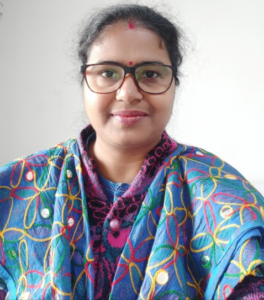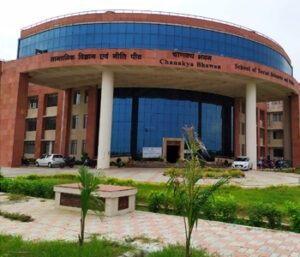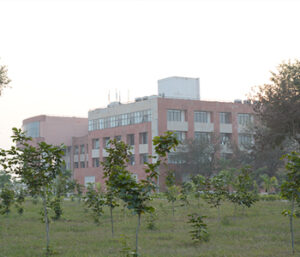









Department of English aims to create awareness amongst students to have an inter-lingual approach for the proficient understanding of Literature irrespective of boundaries of languages and barriers of regions. To be successful in pedagogical practices of multiple academic relevance students are trained to remain aware of the strategies that can lead to the inculcation of skillful presentation and representation of ideas in oral and written modes. It simultaneously seeks to incorporate strategies for language proficiency as a major tool for cognitive development in varied contexts. Techno-sound strategies have been installed to meet the contemporary requirements and challenges of language learning. The Department in its major focus streamlines the methodologies for teaching English as one of the foreign languages both in theory and in practice. The course aims at teaching Language and Literature in English representing historical scope, cultural diversity, and various genres in socio-politico-linguistic contexts. Apart from focusing on British, European, Indian, and American Literature written in English, the course also includes new Literatures in English embodying the theory and practice of translation. It also incorporates the theoretical framework of Literature which goes in the name of theories and criticism.
Department Overview
|
Established in |
2012 |
|
Employee Strength |
Faculty- 08 |
|
Student Strength |
Research Scholar & JRF- |
|
Placement 2021 |
x (tentative) |
|
Publications, Books & Patent |
Publications- |
News and Announcements
Important Links
-
Formats & Downloads
-
Archive
Board of Studies (BoS)
BoS is a statutory body for each department/centre, primarily responsible for syllabus design and regular update. As described in the Ordinance section 25.10,
The functions of the Board of Studies shall be:-- To recommend to the School Board, courses of studies offered by the Department/Centre and continue updating syllabus;
- To take all steps in accordance with the provisions of the Regulations about teaching and evaluation of various courses/programmes of the Department/Centre;
- To recommend to the School Board measures for the improvement of teaching and research in the Department/Centre;
- To constitute panels of experts to be considered for appointment as Examiners, Board of Examiners for various courses/academic programmes and M.Phil./Ph.D. thesis representing various specializations of Departments/Centres; and
- To perform such other functions as may be assigned to it by the School Board, the Academic Council, the Executive Council and the Vice-Chancellor.
Department Committee (DC)
As enshrined in the Ordinace-26, the Department/Centre Committee (DC/CC) shall consist of the Head of the Department/Centre, as Chairperson ex-officio, and all faculty members of the Department/Centre.
26.2 The Department/Centre Committee shall have the following functions, namely–- To make proposals to the Board of Studies on academic programmes concerning teaching and research, and the creation, specialization and abolition of teaching posts;
- To propose schemes for the maintenance and improvement of the standards of various programmes of study and research of the Department/Centre;
- To apportion the teaching and co-curricular work of the Department/Centre among the teachers thereof and monitor the proper execution thereof;
- To consider and decide on the assignment and utilisation of the space, equipment and other assets of the Department/Centre and other matters of general and academic interest of the Department/Centre;
- To consider and recommend perspectives and major thrust areas for research and to propose research projects to be taken up by the members of the Department/Centre, individually/collectively;
- To review and apprise the SRC/URC with the current status of research in Department/Centre;
- To suggest to SRC/URC norms related to qualifications and research experience of a faculty to be recognized as a research degree supervisor and to constitute Department/Centre Research Degree Committee (DRC/CRC);
- To suggest to University Admission, Teaching and Evaluation Committee (UATEC) on any issue related to admission, teaching, continuous evaluation in courses and students’ assessment of courses, offered by the Department/Centre to improve quality of education.
- To constitute such Committee(s) comprising members of the Department/Centre, and if necessary external experts, for framing and implementation of rules and regulations related to admission, teaching, continuous evaluation, maintenance of students’ records including alumni affairs as well as promotion of research and development; and
- To perform such other functions as may be assigned by the Ordinances or Regulations, or by the Vice- Chancellor/Dean/School Board from time to time.
Department Research Degree Committee (DRDC)
Departmental/Centre Research Degree Committee (DRDC/CRDC) deal with all matters connected with the Ph.D. Programme of the Department and report the matter to the University Research Degree Committee (URDC), as per University Ordinance-33. It consists of the Head of Department/Centre as Chairman and other faculties in the department.
Functions of DRDC/CRDC are as follows:- Allotment of Supervisor, Co-Supervisor, recording reasons for not admitting a candidate.
- Recommendation for extension of time for submission of thesis
- Recommendation to peruse a part of research outside the University
- Approval of the Course Work
- Assessment and Grading in Course Work
- Monitoring the research progress of the candidate
- Approval of Research plan proposal/language
- Sanction of duty leave to the Ph.D. candidate
- Assessment of Ph.D. work through pre-submission seminar
- Maintaining the record of research paper publications of the candidate
- 11 Recommendation of panel of experts for thesis evaluation
- Assessment of revised thesis for satisfactory compliance, if any
- Arrangement of Viva-voce in the absence of the supervisor
- Recommendation to waive the Viva-voce
Research Advisory Committee (RAC)
A Research Advisory Committee (RAC) is constituted for every research scholar admitted in PhD programme. The Committee would guide the research scholar to develop the study design and methodology of research and to To periodically review and assist in the progress of the research work of the research scholar. The committee shall have also have power to recommend the co-supervisor and cancellation of registration
Vision |
|
Mission |
The department wishes to grow further as a diverse and socially responsible learning centre known for its high-quality scholarship and the highest standards of excellence in teaching, research and creative expression. The department’s core values include a commitment to: |
- Objectives of the Programme: The M.A. program comprises works of literature around the globe. The study of it facilitates the learners with a free travel pass to explore different worlds via words through the specifics of a text or a philosophical idea. The M.A. program facilitates the learners to learn and understand the nuances not only of Literary Studies but also of Cultural and Literary Theories. The interdisciplinary courses of the program enable the learners to think critically about issues of paramount importance to all. The program enables the learners with advanced level English language skills for their personality development and professional gain. It provides the learners the fundamental training to become English language teaching experts at school level and college level. The courses on Translation Studies and on Linguistics enable the learners with a basic level understanding of these disciplines.
- Program Outcomes: To equip the learners with the basic training for research and further studies in the field of Humanities and Social Sciences. It provides the learners fundamental training for placement in various academic and corporate sectors.
- Eligibility: Bachelor's Degree in any discipline from recognized University with a minimum of 55% marks for General / OBC candidates and 50% marks for SC/ST / PWD candidates.
- Intake: 45
- Objectives of the Program:
The Objectives of the Ph. D. programme are:- To harvest relevant and impactful research in the area of English literature and language.
- To develop critical thinking of the researcher and to introduce major literary theories in literature and their usage in research.
- To create a scientific temper and disseminate knowledge and information about the currently existing research approaches and methods.
- To develop academic research in both language and literature studies with special emphasis on Indian Literature and culture.
- Programme Outcomes:
- A Ph.D. degree in English provides scholars job opportunities at various institutes for research and teaching.
- It provides the scholars a basic training for critical thinking that enables them to participate in various debates of national and global importance.
- Eligibility: M.A in English (Literature / Linguistics) from any recognised University with 55% in aggregate or its equivalent Grade B in UGC 7 point scale. A Relaxation of 5% of marks from 55 to 50% or an equivalent relaxation of Grade for SC/ST/Differently abled candidates. Note: A candidate who is qualified in a national level test such as National Eligibility Test (NET-JRF), NET-LS (without fellowship), Graduate Aptitude Test for Engineering (GATE), State Level Eligibility Test (SLET) accredited by UGC/Central or State Government may be considered for direct admission to the PhD Programme without appearing in the CUCET Entrance Test. However, such candidates have to apply for the programme on CUCET portal and pay the requisite fees.
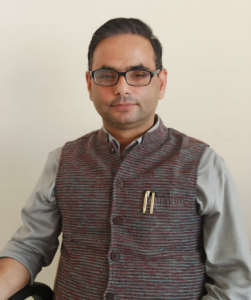

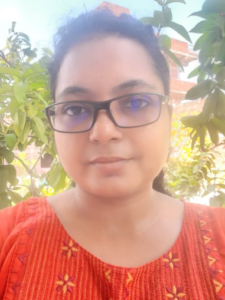



- Lab facility: NIL
- Research Lab
- List of instruments in the Lab : NIL
- Lab staffs and their contact : NIL
- Project
- Specific Research Areas
- Research Publications
E-Resources for Courses
|
Course Code |
Course Name |
Question papers (Previous Years) |
Notes and Presentations |
Video and Suggested readings |
Course Assessment Design - MA
- Semester –I
- Semester –II
- Semester –III
- Semester-IV
Gallery
Department of English


